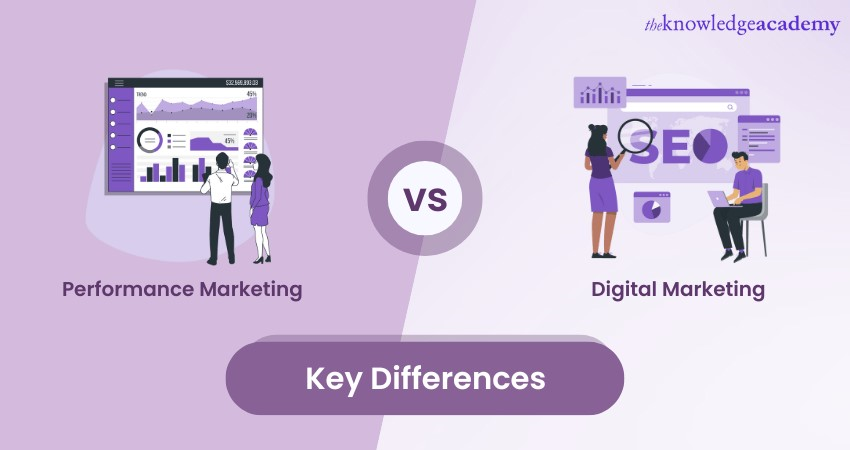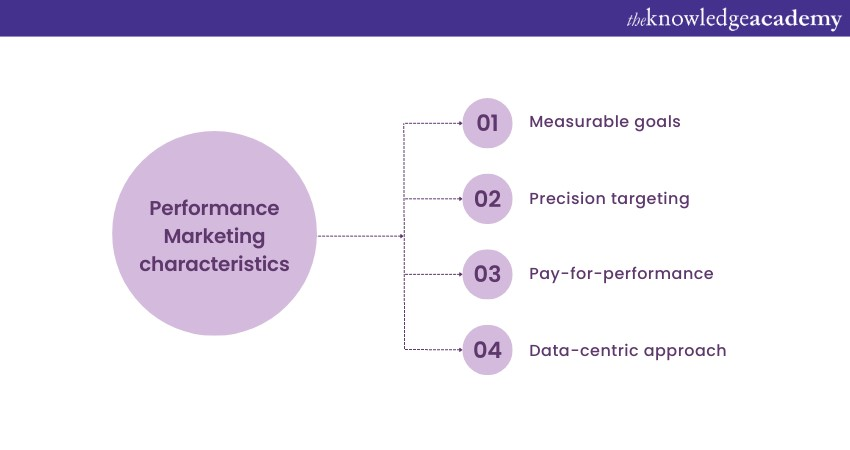We may not have the course you’re looking for. If you enquire or give us a call on 01344203999 and speak to our training experts, we may still be able to help with your training requirements.
We ensure quality, budget-alignment, and timely delivery by our expert instructors.

Navigating the digital landscape can be a maze, especially when terms like "Performance Marketing vs Digital Marketing" swirl around. While both play significant roles in the online world, their approaches and objectives differ profoundly, especially when considering the Role of Digital Marketing in shaping business strategies.
In our quest to simplify the complex, this blog dives deep into distinguishing the core differences between Performance Marketing and Digital Marketing. Unveiling nuances and shedding light on strategies, this piece acts as your compass. Dive in to decode the domains of online advertising and harness their potential for your business.
Table of Contents
1) What is Digital Marketing?
2) What is Performance Marketing?
3) Key differences between Performance Marketing and Digital Marketing
4) Choosing the right strategy for your business
5) Conclusion
What is Digital Marketing?
The ability of Digital Marketing is vast and continually expanding. It embraces numerous platforms and techniques that empower businesses to reach potential customers. As consumers' habits shift towards digital interactions, understanding the intricacies of Digital Marketing has become paramount for any business striving to thrive in the modern marketplace.

Digital Marketing operates within a diverse ecosystem of channels, each catering to specific aspects of a comprehensive marketing strategy. The following are the channels of Digital Marketing:
1) Social media marketing: Social media platforms such as Facebook, X, and LinkedIn provide fertile ground for engaging with target audiences, sharing valuable content, and fostering brand loyalty. Businesses can create targeted advertisements, interact with customers, and build a robust online community.
2) Content marketing: Content lies at the heart of Digital Marketing. Through blogs, articles, videos, infographics, and more, businesses can provide valuable information, answer customer queries, and position themselves as industry authorities. This not only helps in building trust but also enhances SEO efforts.
3) Email marketing: It is a powerful medium for reaching a subscribed audience. Businesses can send personalised offers, updates, newsletters, and more to nurture customer relationships and drive engagement.
4) Search Engine Optimisation: Search Engine Optimisation (SEO) optimises a website to position itself more reasonably on Search Engine Result Pages (SERPs). It helps increase visibility and organic traffic while driving potential customers to your website.
5) Pay-Per-Click advertisement: Pay-Per-Click advertising (PPC) involves placing targeted ads on search engines and social media platforms. Advertisers pay when internet users click on their advertisement, making it a cost-effective way to drive relevant website traffic.
What is Performance Marketing?
Where businesses seek more precise ways to allocate their marketing resources, Performance Marketing Strategy emerges as a targeted and results-driven approach. Unlike traditional marketing methods, which focus on brand exposure and impressions, Performance Marketing emphasizes tangible actions and measurable results. At its core, this strategy ensures that every marketing effort directly contributes to achieving specific goals and generating a quantifiable Return on Investment (ROI).

Performance Marketing is distinguished by several key characteristics that set it apart from other marketing strategies:
1) Measurable goals: At the heart of Performance Marketing lies the concept of measurable goals. Every campaign is meticulously structured around well-defined objectives that can be quantified. These goals range from increasing e-commerce sales and driving app installations to generating leads and boosting sign-ups.
2) Precision targeting: Performance Marketing is about reaching the right audience with the right message at the right time. Advertisers leverage sophisticated targeting tools to identify and engage with the most relevant segments of their target market, ensuring that resources are utilised efficiently.
3) Pay-for-performance: Unlike Traditional Marketing and Digital Marketing methods that involve upfront costs regardless of outcomes, Performance Marketing operates on a pay-for-performance model. Advertisers only pay when the desired action is completed. This dynamic ensures a direct correlation between expenditures and results.
4) Data centric approach: Data is the lifeblood of Performance Marketing. Data insights and analytics inform every aspect of a campaign. This data-driven approach allows for continuous optimisation and refinement from audience behaviour to campaign performance.
Key differences between Performance Marketing and Digital Marketing
It is crucial to recognise that not all strategies are created equal. Performance Marketing and Digital Marketing might sound similar, but they have distinct characteristics that set them apart. Let's dive into the key differences between these two strategies to understand how they cater to different aspects of a comprehensive marketing approach.
Digital Marketing consists of a wide range of online activities to build brand awareness, engagement, and visibility across various digital channels. It's about creating a strong online presence through platforms like social media, content creation, email campaigns, and SEO. Digital Marketing aims to establish and maintain a brand's reputation and credibility in the digital realm.
On the other hand, Performance Marketing narrows its focus on driving specific actions that directly impact a business's bottom line. Content Performance Marketing aims to achieve measurable outcomes, including clicks, conversions, sales, sign-ups, or app installations. Performance Marketing is all about results-driven campaigns that contribute directly to the success of business goals.
|
Aspect |
Performance Marketing |
Digital Marketing |
|
Definition |
A subset of Digital Marketing where advertisers pay marketing companies based on the performance of the advertisement (usually in terms of actions like sales, clicks, or leads). |
The promotion of products, services, or brands via digital channels. Includes channels like social media, email, search engines, websites, and more. |
|
Payment model |
Pay-for-performance (e.g., pay-per-click, pay-per-sale, pay-per-lead). |
Various, including fixed fees, retainers, and performance-based models. |
|
Focus |
Results-driven. Measures direct results of specific campaigns in terms of conversions and ROI. |
Results-driven. Measures direct results of specific campaigns in terms of conversions and ROI. |
|
Channels |
Often affiliate marketing, search engine advertising, and other ROI-focused campaigns. |
Social media, SEO, content marketing, email marketing, PPC, and more. |
|
Metrics |
Conversion rate, ROI, Cost-per-action (CPA), Cost-per-click (CPC), Cost-per-lead (CPL). |
Impressions, clicks, conversion rate, engagement rate, open rate (for emails), etc. |
|
Flexibility |
Highly focused and can be easily scaled or adjusted based on performance metrics. |
More comprehensive strategy. Adjustments may take longer due to the breadth of channels and strategies. |
|
Risk |
Lower risk for advertisers since they pay for actual results. |
Lower risk for advertisers since they pay for actual results. |
|
Time to see results |
Often quicker results as campaigns are highly targeted and optimised for conversions. |
Can take longer, especially with strategies like SEO or brand awareness campaigns. |
|
Goal |
Immediate actions such as a sale, sign-up, or download. |
Immediate actions such as a sale, sign-up, or download. |
|
Longevity |
Typically short-term and campaign-specific. |
Can have both short-term and long-term strategies. |
In Digital Marketing, businesses typically incur upfront costs for content creation, ad placements, and campaign management. These costs are usually fixed and might not immediately correlate with the outcomes achieved. While Digital Marketing can be effective for brand building and engagement, the Return on Investment (ROI) might take time to manifest.
Performance Marketing, on the other hand, operates on a pay-for-performance model. Advertisers only pay when a predefined action is completed. This means that you are paying for actual results, ensuring a more direct link between your spending and the outcomes you seek. This cost structure aligns marketing expenses with measurable actions, reducing the risk of the expenditure without tangible returns.
In Digital Marketing, success is often measured using metrics such as impressions, click-through rates, engagement rates, and social media followers. While these metrics provide insights into the reach and visibility of your campaigns, they might translate into something other than tangible business outcomes. The focus is on gauging audience interaction and brand exposure.
On the other hand, Performance Marketing employs more precise measurement and analytics. The success of a Performance Marketing campaign is decided by whether specific, well-defined actions are accomplished. This could be anything from a user purchasing to signing up for a newsletter. The focus is on quantifiable results, making it easier to calculate ROI and assess the effectiveness of a campaign.
Ready to master the art of driving results in the digital world? Discover our specialised Performance Marketing Training and uncover the secrets of data-driven success.
Choosing the right strategy for your business
The starting point in determining the most suitable strategy is clearly understanding your business goals. What are you aiming to achieve through your marketing efforts? Are you focused on brand awareness and engagement, or are you more concerned with driving specific actions that lead to conversions?
Digital Marketing might be the way to go if your primary objective is to establish a solid online presence, engage with a broad audience, and enhance brand recognition. This strategy encompasses a variety of tactics, from content generation and social media engagement to email campaigns and SEO, all of which contribute to building a robust online identity.
On the other hand, if you are looking to drive actions that directly impact your business's revenue or user base, Performance Marketing could be a better fit. This strategy achieves measurable outcomes, such as generating leads, increasing sales, boosting app installations, or growing subscription numbers. Performance Marketing allows you to allocate resources directly to campaigns that drive tangible results.
If your audience spends a considerable amount of time on social media, consumes content regularly, and values engagement and brand interaction, then Digital Marketing tactics, which include social media campaigns, content creation, and influencer partnerships, could resonate well.
Suppose your audience likes to take specific actions like online purchases, signing up for services, or downloading apps. In that case, Performance Marketing can help you tailor campaigns to meet these audience behaviours.
Conclusion
In marketing, comprehending the contrasting strengths of Performance Marketing and Digital Marketing is essential. While Digital Marketing builds brand presence, Performance Marketing delivers quantifiable actions. Incorporating both can yield a comprehensive strategy that echoes with the audience, maximises resource allocation, and drives tangible results. We hope that after reading this blog, you are better positioned to choose between Performance Marketing vs Digital Marketing for your organisation.
Ready to take your marketing skills to the next level? Explore our comprehensive range of Digital Marketing Courses and elevate your expertise.
Frequently Asked Questions
What are the Other Resources and Offers Provided by The Knowledge Academy?

The Knowledge Academy takes global learning to new heights, offering over 3,000 online courses across 490+ locations in 190+ countries. This expansive reach ensures accessibility and convenience for learners worldwide.
Alongside our diverse Online Course Catalogue, encompassing 19 major categories, we go the extra mile by providing a plethora of free educational Online Resources like News updates, Blogs, videos, webinars, and interview questions. Tailoring learning experiences further, professionals can maximise value with customisable Course Bundles of TKA.
Upcoming Digital Marketing Resources Batches & Dates
Date
 Digital Marketing Course
Digital Marketing Course
Fri 23rd May 2025
Fri 25th Jul 2025
Fri 26th Sep 2025
Fri 28th Nov 2025






 Top Rated Course
Top Rated Course



 If you wish to make any changes to your course, please
If you wish to make any changes to your course, please


